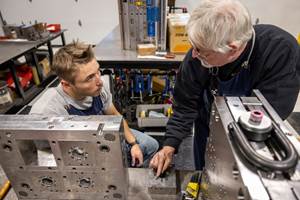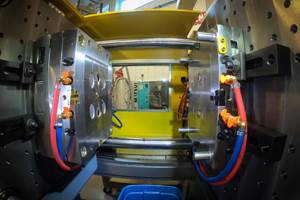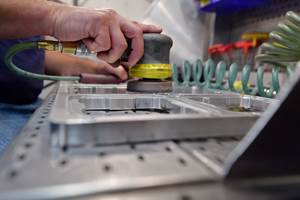Liquid Silicone Injection Molding Symposium: Innovation on Display
5th annual LIMS™ Symposium focuses on emerging advancements in LSR, anti-microbials, dispersions, multi-shot molding and equipment
Shin-Etsu Silicones of America, Inc. and Arburg, Inc. recently co-hosted their 5th Annual Liquid Silicone Injection Molding Symposium at Arburg’s state-of-the-art Technology Center Midwest in Elgin, IL. A world class line-up of material and equipment suppliers profiled Innovations in LIMS™ (Liquid Injection Molding System) technology and products including: molding and process equipment, molds, computer simulation advancements for LIMS part & mold flow, and LSR pumping systems & injection nozzles. Dedicated tracks also addressed multi-component applications for Liquid Silicone Rubber− a vital topic in the Medical, Consumer, and Automotive markets.
Over 100 LSR industry professionals attended the symposium and experienced hands-on equipment displays and presentations from industry leading keynote speakers including: Shin-Etsu Silicones of America, Arburg, Gayson SDI, Kruse Analysis, Roembke Mfg. and Design, and Fluid Automation. The following is a synopsis of key innovations and considerations for today’s LSR market applications.
SHIN-ETSU SILICONES OF AMERICA, INC. (Akron, OH)
Presentation: LIMS for Medical/Multi-Component Parts
Presenter: Eric Bishop: North America Marketing Manager
Eric Bishop, North America Marketing Manager for Shin-Etsu Silicones of America, Inc. (SESA: A U.S. subsidiary of Shin-Etsu Chemical Co. Ltd., Japan), noted that SESA is broadening the unique palette of properties of its Select-Hesive™ LIMS KE2090 Series. In addition to the core benefits of eliminating the need for hazardous priming, inconvenient pre-treatments, and costly secondary assembly operations, the series now provides new hardness ranges from 5- to-70, Shore-A. “The goal is to expand the series’ primer-less adhesion benefits to a wider range of applications. We’re seeing an increased demand for softer silicones,” stated Bishop.
Notably, SESA is also having success utilizing their KE2090 Series with higher temperature thermoplastic resin substrates such as PEEK, PSU, PPSU, and PEI. According to Bishop, “The ability to run the over-mold temperature hotter, allows the silicone to cure faster, which lowers the cycle time–ultimately increasing the productivity of the equipment.”
In identifying key market applications that would benefit from the KE2090 Series Select-Hesive™ properties, Bishop noted that it is particularly suitable for the growing market for reusable medical and dental instruments that require high temperature autoclave steam-sterilization. Additionally, the KE2090 Series has been tested for compliance with USP Class VI and ISO 10993 regulatory standards for biocompatibility.
Within the spectrum of SESA’s established and expanded LIMS product offerings, Bishop emphasized the vital importance of ‘lot-to-lot’ consistency and process flexibility for today’s high-value liquid silicone molders. According to Bishop, “Our workhorse KEG2000 Series products offer a wide processing window. The properties of each batch remain consistent which saves time for the processor while improving the quality of the parts by reducing defects.” Bishop stressed that world-wide customers depend on Shin-Etsu’s consistency to ensure that their process remains in control and does not require constant adjustments to account for variations in the liquid silicone.
ARBURG (Lossburg, Germany / Elgin, IL)
Presentation: LIMS & Multi-Shot IMM Technology
Presenter: Martin Neff / Manager Midwest Sales & Engineering
ARBURG, a leading global manufacturer of injection molding machines for plastics processing, provided a Liquid Silicone Rubber (LSR) molding demonstration of their ALLROUNDER 470 A (1000-70) running Shin-Etsu's KEG2000-40 Series material in a 4-cavity baby nipple mold. The economical, high-performance, 110 ton machine is equipped with an integrated 3-axis ARBURG MULTILIFT servo-drive robot and a LSR dosing machine from Fluid Automation. The machine is used in industries that require an optimum level of efficiency, even where a high level of performance is expected, such as the medical technology sector and the food, packaging and automotive industries.
The electric ALLROUNDER 470 A machine features 18.5” tie-bar spacing and 3.4 oz maximum injection shot size that offers the flexibility to go as small as 12mm screw size to optimize efficiency according to shot volume and process requirements. The integrated 3-axis MULTILIFT V robot features an integrated machine control system responsible for controlling the entire robot cell. Features for ensuring LSR shot-to-shot repeatability and accuracy include a special check ring assembly for the screw and regulated back pressure control via servo drive with paraxial measurement at the screw and the point of process.
According to Martin Neff, ARBURG’s U.S. Manager Midwest Sales & Engineering, “The importance of accuracy and repeatability cannot be understated in LSR production. The drive technology of the ALLROUNDER electric machine features a planetary roller screw drive and liquid cooled servo-electric motors. These key elements provide fast, energy efficient, precise, and responsive acceleration/deceleration movements with a short intervention time. This allows for responsive adjustments to process accuracy for the LSR material viscosity and consequently shot-to-shot consistency while reducing cycle time.”
Neff emphasized the inherent value of ‘clean’ production via a liquid cooled motor and direct drive system which maintains the same temperature-level and controls the measurement and lube times in the injection process to provide the high level of precision needed. Finally, he noted the importance of integrating the necessary process equipment through the machine control including vacuum pumps and needle type shut-off nozzles that are independent to each cavity filling.
ROEMBKE MFG. & DESIGN, INC. (Ossian, IN)
Presentation: Developments in LSR Molding
Presenter: Troy Smith / VP Sales & Marketing
Industry leading experts in the design and build of inserted flashless rubber molds, Roembke Mfg. & Design President Greg Roembke offered insights into developments in LSR flashless tooling and internal cavity mold pressure sensors which can measure imperfections and correct them during each shot– essentially allowing molders to achieve a window into what's happening inside the mold with each process.
Notably, Roembke focused its attention to a new 2-Shot (rubber/plastic) technology system they are spearheading in the North American market. The key to the technology vs. the transfer method is that one machine gets the entire product out in molding plastic and LSR together–thus, eliminating an entire step in the molding process. Since it’s a 2-shot system, the warm LSR will adhere to warm plastics better. The 2-shot system could use a Shin-Etsu self-bonding material to adhere the silicone to the plastic substrate.. Additionally, internal mold pressure sensors can be incorporated which allows complete control of the valve gates including: balance of the cold runner, monitoring the internal cavity material, and its temperature and/or pressure.
According to Troy Smith, Roembke VP Sales & Marketing, “Over the long-haul, it will save processors significant set-up time and, ultimately, time to market. Additionally, it will eliminate the waste of allowing plastics to lay around unused and potentially getting contaminated by dirt, dust, etc.”
Smith noted that while the 2-shot technology is still relatively new in North America, the European market has embraced it. Initial concerns are primarily driven by the upfront capital cost investment and the required time to learn the technology. To introduce this cost-effectively, Roembke is developing an economical prototype of the system to initial clients before committing to it. In the hybrid concept, clients can purchase inserts for standard cold deck from (LSR) and hot runner system (Plastics), then they can make shrinkage adjustments on a prototype basis versus an entire production setting. Once a client sees significant results and want to move forward, Roembke can finalize the system and build an entire production mold based on the sampling.
GAYSON SDI (Barberton, OH)
Presentation: 3rd Stream LSR Metering Materials
Presenter: Tom Manello / Sales Manager
Gayson Silicone Dispersions, Inc. (GSDI), a leader in pigment, chemical additive, and catalyst dispersions for HCR/LSR/RTV applications since 1979. Whereas color is a hot trend in multiple market LSR applications for product identification, corporate product branding, and overall aesthetics, it is often considered late in the LIMS production process which can lead to unwanted and costly problems. According to GSDI Sales Manager Tom Manello, “Troubleshooting color considerations as early as possible in the design engineering and production tool building phase is the key to avoiding color issues when a part goes into production.”
Manello noted that dispersion is when powders are broken down to their primary particle size and uniformly distributed throughout the silicone carrier. Particular emphasis was placed on open communication between end-users and the color lab in the early design phases of the LSR production process and the importance of running a color trial on the tool that’s being qualified.
In conclusion, Manello stressed that, “If color is not addressed early in the design phase of a part, then problems can pop-up when a part goes to production. These issues can get tricky after the fact and be avoided as communication is initiated in the design phase as each pigment has its own distinct characteristics which could adversely affect production.”
GSDI develops manufactures over 10,000 custom color variations including three key product lines for LSR: Silcopas® (dispersions line for LSR/RTV Silicones), Silcogum® (dispersions for HCR/HCE silicones), and Silcosperse® (dispersions of chemical additives; i.e.-antimicrobial, heat stabilizer, etc. to modify silicones).
GAYSON SDI (Barberton, OH)
Presentation: 3rd Stream LSR Metering Materials
Presenter: Tom Manello / Sales Manager
Gayson Silicone Dispersions, Inc. (GSDI), a leader in pigment, chemical additive, and catalyst dispersions for HCR/LSR/RTV applications since 1979. Whereas color is a hot trend in multiple market LSR applications for product identification, corporate product branding, and overall aesthetics, it is often considered late in the LIMS production process which can lead to unwanted and costly problems. According to GSDI Sales Manager Tom Manello, “Troubleshooting color considerations as early as possible in the design engineering and production tool building phase is the key to avoiding color issues when a part goes into production.”
Manello noted that dispersion is when powders are broken down to their primary particle size and uniformly distributed throughout the silicone carrier. Particular emphasis was placed on open communication between end-users and the color lab in the early design phases of the LSR production process and the importance of running a color trial on the tool that’s being qualified.
In conclusion, Manello stressed that, “If color is not addressed early in the design phase of a part, then problems can pop-up when a part goes to production. These issues can get tricky after the fact and be avoided as communication is initiated in the design phase as each pigment has its own distinct characteristics which could adversely affect production.”
GSDI develops manufactures over 10,000 custom color variations including three key product lines for LSR: Silcopas® (dispersions line for LSR/RTV Silicones), Silcogum® (dispersions for HCR/HCE silicones), and Silcosperse® (dispersions of chemical additives; i.e.-antimicrobial, heat stabilizer, etc. to modify silicones).
KRUSE ANALYSIS, INC. (Naples, FL)
Presentation: Simulation: LIMS Part + Mold Flow
Presenter: Torsten Kruse / Owner
With an eye on the present and future potential of silicone technology, Torsten Kruse, owner of Kruse Analysis, Inc., presented his company’s innovative CAE (computer aided engineering) injection molding simulation services which are being adopted in the early phases of LIMS mold-making to determine thermal behaviors in steel molds prior to building. Kruse noted that while the technology has been prevalently used in plastics injection molding, the LSR industry is just beginning to embrace true 3-D LIMS simulations to maximize mold designs.
Kruse’s ‘true’ 3-D LIMS simulations integrate a combination of the part and the actual mold in the simulation to determine thermal behaviors in steel molds. The combination is unique as it integrates CAD mold design prior to molding to determine capabilities on thermal side and manipulate the design of mold. This also includes optimizing the position on the heating rods and heating system to get better uniform heat and therefore more uniform properties. Additionally, it can help clearly determine the right entry points into the mold so it gets filled properly.
According to Kruse, “Molds are getting more complex and expensive so if you make a mistake early on it can cost you time and wasted capital expenditures. This technology, when utilized early on, provides a valuable sneak peak preview so you can build a tool that is very specific and will maximize your needs.” Having worked in molding simulation technology for multiple markets since 1988, Kruse also noted that the LIMS market now has the CAE simulation technology at their domain and are increasingly embracing it to leverage to their advantage moving forward.
SHIN-ETSU SILICONES CORPORATE PROFILE: A U.S. subsidiary of Shin-Etsu Chemical Co. Ltd., Japan, Shin-Etsu Silicones of America Inc. offers vast technical and capital resources to formulate solutions as a major supplier of silicone materials to North America's medical, automotive, electronics, aerospace, and manufacturing industries. Shin-Etsu’s premium silicone compounds incorporate leading-edge technology, staff expertise, and value-added service; offering customers the highest levels of quality and consistency in specialty silicone materials.
ARBURG CORPORATE PROFILE: Founded in 1945 and represented in 85 countries worldwide, the Arburg group is one of the world's leading companies in injection molding machine construction. Beyond the production of injection molding machines, Arburg provides all technology modules such as injection molding machine and automation from one source. Arburg’s turnkey solutions consist of injection molding machine, automation, training and a full range of plastics processing technology modules for: injection molding machines for thermoplastics and elastomers as far as automation.
For more detailed information, visit the Shin-Etsu Silicones web site at:
www.shinetsusilicones.com or call: (330) 630-9860.
Related Content
Eden Tool and Eden Manufacturing: A Story of Resilience, Growth and Innovation
This critical parts manufacturer, founded on solid tooling fundamentals, didn’t get derailed with the unexpected passing of the owner because leadership was already building a solid business, not just a good tool shop. Here’s how they managed change incrementally… and they’re not finished yet.
Read MorePredictive Manufacturing Moves Mold Builder into Advanced Medical Component Manufacturing
From a hot rod hobby, medical molds and shop performance to technology extremes, key relationships and a growth strategy, it’s obvious details matter at Eden Tool.
Read MoreMantle TrueShape Advances Medical Mold Manufacture
In a recent case study, Mantle’s 3D-printed inserts enabled a medical device manufacturer to reduce 12-week lead times for prototype mold production to 4 weeks and at one-third of the cost.
Read MoreInnovative Mold Building Enhances Packaging Material Efficiency, Elevates Recyclable Design
A manufacturing-focused design and optimized tooling enhance material efficiency in packaging for a new medical instrument.
Read MoreRead Next
How to Use Strategic Planning Tools, Data to Manage the Human Side of Business
Q&A with Marion Wells, MMT EAB member and founder of Human Asset Management.
Read MoreAre You a Moldmaker Considering 3D Printing? Consider the 3D Printing Workshop at NPE2024
Presentations will cover 3D printing for mold tooling, material innovation, product development, bridge production and full-scale, high-volume additive manufacturing.
Read MoreReasons to Use Fiber Lasers for Mold Cleaning
Fiber lasers offer a simplicity, speed, control and portability, minimizing mold cleaning risks.
Read More



.jpg;maxWidth=300;quality=90)















